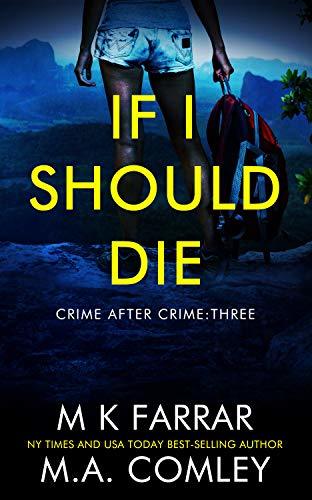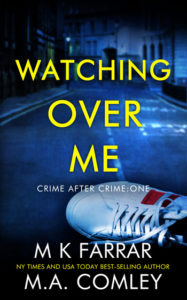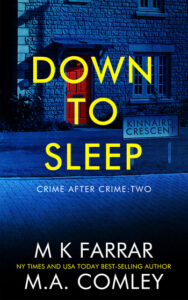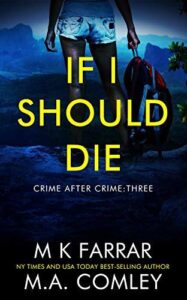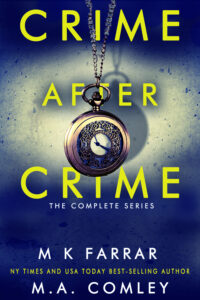Prologue
The figure was a mere spot in the distance.
Bent against the sloping hillside, the weight of their pack increasing their stoop, they plodded on, unaware they were being followed.
I paused long enough to catch my breath and admire the view. It was truly beautiful out here. Heavy white clouds gathered around the mountain peak, thick and lustrous in the blue of the sky. High overhead, a couple of buzzards used the thermals to soar.
The isolation was what these people loved, which worked perfectly for me.
The stark landscape of the Scottish Highlands was as capable of killing as I was. When the sun shone, the rolling hills and glasslike water of the lochs was enough to make you catch your breath, but in the distance were the jagged mountains that would be topped with snow in the winter months. Ten people had died during the previous winter season, and now, though it was almost summer, I intended to add some more to the body count.
I wasn’t a young man any longer.
I’d felt the passing of time more acutely these past couple of years. My own mortality wasn’t something I’d ever given much thought to. I was someone who took life, not someone who had it taken. But lately, I couldn’t deny that I was getting older. My body ached in a way it never had. My teeth had grown weaker. My hair appeared thinner in certain lights.
Time was running out.
And with that acknowledgement came panic. I still hadn’t fulfilled my full potential. The drive within me was like a wave, peaks of intense highs and desires and needs I couldn’t control, followed by troughs where I felt like I was in a time of hibernation, resting and growing stronger. My most recent period of inactivity had been longer than any previously, and before I’d realised it, years had passed. What was becoming of me? Had I lost my touch? I’d thought perhaps I had, and maybe something had changed within me. It was only normal for drives to adjust within a man once he’d grown older. Hormones affected virility and muscle strength in the same way it had my teeth and hair, and I wondered if the passion had simply gone.
But then I woke one morning, and something had shifted. A new fire had ignited within me, a switch flicked on, waking me from my slumber. And at that moment I realised nothing had changed. I’d needed the extended rest because this would be bigger than anything else. The challenge and risks far greater.
I was a patient man. I’d proven that to myself over the years. In fact, I enjoyed the wait. Making things last longer allowed me to savour them fully, but it did also mean that when they were over, the trough hit me even harder. It was a kind of mourning, I believed. Something—someone—who had taken up such a huge part of my life, someone I’d devoted all my attention and focus towards, was no longer there, and I was grieving that loss. Ha! How they would react if I tried to imply that they should be grateful for the attention I’d given them. How many other men did that? But did I ever get a word of thanks? Of course not.
I wondered if they ever missed me, too?
I’d been tempted to go back, but it was never worth the risk. One thing I had that was stronger than my desire to cause pain was my own sense of self-preservation. I had no intention of languishing away in prison for years. I’d already had a taster of what that was like, and I’d rather die than repeat it.
Out here, the space helped me think. I could literally be anyone I wanted to be. People recognised me as one of their own, and drew me into their small gatherings, cosying up in the remote pubs they came across, or camping when the weather was good. There was none of the suspicion of the cities, where everyone automatically closed up if a stranger spoke to them. Things had grown even worse in recent years. Social media hadn’t helped with that. Crime was no more prevalent than it had been thirty years ago, but everyone knew about it now. The world felt like a more dangerous place, and the population reacted as such.
Of course, they had every right to be mistrustful of me, and they were right to be wary, but out here, people didn’t act that way. The walking boots, the poles, the backpack all signalled we were the same sort of ilk. Part of a club.
Then they let down their guard.
I was always amazed at the amount some individuals told strangers about their lives. Those with a family, or work they needed to get back to, or friends they were meeting along the route would be an instant no for me. I had to be sure whoever I chose wouldn’t be missed.
These were the only times I ever really felt anything. The rest of the time I was like a ghost inside a human suit, reacting to things around me in a way I felt someone would if they were alive. Human. Real. I wore a mask, and I was good at it. I knew how to laugh and smile in all the right places, had learned how to mirror their body language to make them feel more comfortable. This wasn’t something I’d studied; I’d fallen into it naturally. It was ironic that the thing I found most natural to do—act like a normal human being—wasn’t natural to me at all.
I continued to track my target, my feet taking the same steps his had only minutes earlier. It was rough terrain, but these past few weeks had increased my fitness, allowing me to traipse up the incline without getting too puffed out.
If the person turned, perhaps taking in the view of the rolling mountains, then I would be spotted. Not that it mattered too much. Even though we were a day or two from civilisation, people often took similar routes. Perhaps he would find it strange that I hadn’t mentioned following the same path a couple of evenings ago, when we’d discussed our hikes while nursing a pint of ale in one of the remote pubs, but I could easily have had a change of heart. Being seen wouldn’t stop me doing what I had planned.
The figure vanished over the top of the hill, disappearing into the valley beyond. I relaxed a fraction, my shoulders dropping, breath huffing from my lungs. The valley would be better, I decided. Less exposed.
I continued my climb to the top until I reached the peak. From this vantage point, I was able to see over the other side. Excitement grew inside me. The anticipation was the only time my heart ever raced. Even during the killing, I was calm, and afterwards, too.
I paused.
He was closer than I’d expected. He must have rested on the other side of the ridge, when he’d been just out of view, catching his breath after the steep climb or simply taking in the vista. Only now he was heading downhill, and his momentum had increased. I wanted to catch up before he reached the bottom.
Staying as light on my feet as it was possible for a full-grown man to manage, I followed him down.
I was a mere couple of feet away when he either heard or sensed my presence. His pace slowed, and he glanced over his shoulder.
A flash of recognition lit the man’s eyes, but the light was quickly dulled by confusion. He was fighting that instinct to be polite, despite deep down knowing something wasn’t quite right. He didn’t stop fully, but he turned in my direction and slowed enough to let me catch up, so he was now almost walking backwards.
“Oh, hello again!” he said, his tone jovial. “I almost didn’t hear you there. I thought you weren’t—”
I moved quickly, pulling the knife from my pocket and opening it with a flick of my wrist. I took another couple of steps, closing the gap between us.
My soon-to-be victim reared back, but not quickly enough. I swung my arm, bringing the blade around in an arc. Sharp metal met with firm flesh, and the flesh lost. The knife sank in deep, and the surprise and confusion in the man’s eyes flashed to fear and pain.
It wouldn’t have mattered if he’d screamed. There was no one around to hear him.
I stepped back, and my victim dropped to his knees.
Despite the blade sticking out of his neck, the man crawled away, somehow knowing that putting distance between himself and the person who’d stabbed him was more important than yanking the knife from his body.
I watched with wry amusement. Where did he even think he was going? There was nothing and nobody out here—no one for him to crawl to for help. Did he realise how slowly he was moving? Each lift and bend of a knee or reach of a hand was in slow motion, as though he was struggling through water. The valley we were in now meant the only way out was if he climbed one of the steep hillsides to the top, and it was hard work even when you didn’t have a knife protruding from your throat. He didn’t stand a chance.
Two paces brought me back in line with him.
“It’s okay.” I kept my voice calm, soothing. “You don’t have to keep fighting now. You can rest.”
A gurgling whine of fear escaped him, but, for some reason, my words didn’t have the desired effect, and he increased his efforts to get away.
His arm buckled under his body, and he slumped forwards, his face planting in the gorse and mud, his backside still in the air. It wasn’t a dignified position at all, and the sight sent a jab of irritation through me. That was the trouble with doing things this way. There wasn’t the time to create the emotional connection with a person that made me more forgiving. If I cared, I could see past the not-so-pretty moments of their lives, but I couldn’t care for someone I barely knew.
I nudged the back of his foot with mine. Our boots almost matched.
“Come on, up you get.”
He complied, pushing himself back up. He didn’t turn to look at me, but kept going, dragging himself through the dirt.
I exhaled a long sigh. This wasn’t working. I wanted more.
“Okay, enough already. It’s time now.”
That gurgling whine came again, and he picked up his pace, fingers digging like claws into the dirt, as though he might somehow drag himself up the hill. Standing over him, I reached down and wrapped my fingers around the handle of the knife. I loved that connection, the sensation of being inside someone. This had never been sexual for me, not like that, but nothing was better than this feeling of power.
Locking my other arm around his head, I dragged the blade through his throat, opening him up. Blood spurted, soaking instantly into the ground, vanishing into the earth.
Ashes to ashes. Dust to dust.
There were many reasons a person could go missing in the Highlands. An accident—a fall from a cliff, perhaps. Or maybe they chose to vanish off the face of the earth, money or relationship problems driving them to it. Peat bogs could grab an unwary walker by the ankles and refuse to release them, dragging them deeper with each of the victim’s struggles.
It didn’t have to be murder.
The killing wasn’t perfect. I preferred the buildup, the control over another person. This way, it was all over too quickly. But my days of making this last were over, weren’t they? I’d come too close to getting caught, and if that happened, I wouldn’t be able to do anything. I thought I might go mad in that situation. If I was unable to fulfil the need driving me, I might as well be dead.
It was done. No more life remained inside the man’s body. I glanced around, wondering what to do with him now.
I spotted a small clump of gorse bushes off the beaten track. That would do. I grabbed him by the legs, right above where his walking boots met his ankles, and pulled.
Moving a body was backbreaking work. I’d always found it strange how a dead person weighed so much more than someone who was still alive. Scientifically, it shouldn’t have made any difference.
The weight of the body dragging through the gorse had left a trail of broken stems, crushed leaves, and flowers. That displeased me. Though it was highly unlikely anyone would notice as they walked by, I still made the effort to go back over the track, using my foot to disturb the uniform layering of the crushed vegetation.
By the time the body was found, it would be weathered, nibbled by insects, maybe even larger animals. Weeks would have passed, possibly months, or longer. The fibres from my clothes were all popular brands that most walkers wore, I made sure of that, as were my gloves. There was the chance I’d left a strand of hair, but it most likely would have blown away by the time he was found. Besides, I knew from the evening spent in the pub that he was around plenty of other people who could easily have shed DNA over him. They may be brought in for questioning, if the police had their data on file, but they would soon be released.
My DNA was on file, but the police would have to do one thing before they could bring me in. One thing I had no intention of happening.
They would have to catch me.

